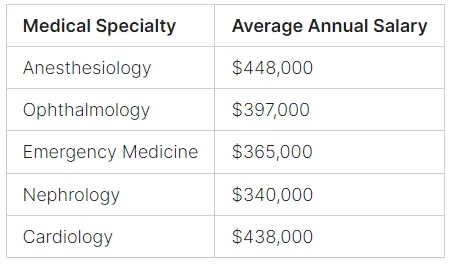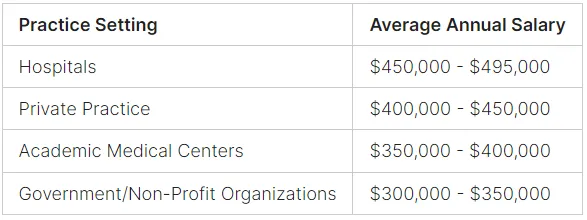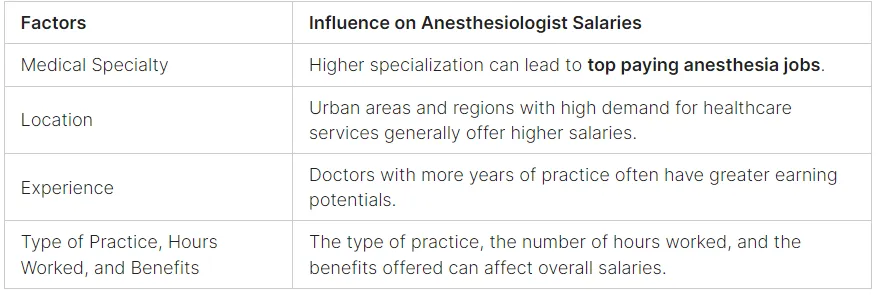Factors Influencing Salary Trends: Exploring Key Drivers of Anesthesiologist Compensation

Anesthesiologists play a critical role in medical procedures, administering anesthesia and ensuring patient safety during surgeries. Due to their expertise and the vital nature of their responsibilities, anesthesiologists earn high salaries. If you're considering a career as an anesthesiologist, it's important to understand the factors that influence salary trends and determine the earning potential within this field.
On average, anesthesiologists in the United States earn an annual salary of $261,730, nearly five times higher than the average income across all occupations. This substantial compensation reflects the combination of their extensive education, specialized training, and the scarcity of their expertise in the healthcare industry.
To become an anesthesiologist, you must invest several years in education and training. This includes completing a bachelor's degree, medical school, and a four-year anesthesiology residency program. Many anesthesiologists also pursue additional specialized training through fellowships in critical care medicine or pain management.
The demand for anesthesiologists is high, especially given their crucial role in ensuring patient safety during surgical procedures. However, their numbers remain relatively low, giving them leverage in negotiating salaries. Anesthesiologists' incomes can vary based on factors such as location, employer, and experience.
Throughout this article, we will explore the various factors that affect anesthesiologist salaries, including the impact of their critical role in medical procedures, the specialized education and training required for this profession, and other relevant factors that contribute to salary trends. By understanding these factors, you'll gain valuable insights into the earning potential of anesthesiologists and make informed decisions about your future career.
Key Takeaways:
- Anesthesiologists earn high salaries due to the combination of their critical role in medical procedures and the scarcity of their expertise.
- The average annual salary for anesthesiologists in the United States is $261,730, significantly higher than the average income across all occupations.
- Extensive education and training, including specialized residency and fellowship programs, are required to become an anesthesiologist.
- The demand for anesthesiologists is high while their numbers remain relatively low, giving them leverage in negotiating salaries.
- Location, employer, and experience are factors that can influence anesthesiologist salaries
The Impact of Anesthesiologists' Critical Role in Medical Procedures on Their Earning Potential

Anesthesiologists play a vital role in ensuring patient safety and comfort during surgical procedures. They administer anesthesia, monitor vital signs, and manage pain, which are crucial for the success of surgeries. Due to the critical nature of their responsibilities, anesthesiologists earn an average annual salary of around $448,000. However, this figure can vary based on factors such as location, employer, and experience.
Anesthesiologist compensation is influenced by several key factors. The geographical location of their practice plays a significant role in determining their pay scale. For instance, anesthesiologists working in metropolitan areas or regions with a high demand for healthcare services tend to earn higher salaries compared to those in rural areas.
Experience is another important factor that impacts anesthesiologist earnings. As an anesthesiologist gains more years of practice and expertise, their compensation tends to increase. Typically, physicians with a long-term, successful career in anesthesiology are among the highest-paid professionals in the medical field.
Moreover, the COVID-19 pandemic has had both positive and negative effects on anesthesiologists' incomes. While the pandemic initially caused disruptions in elective surgeries, leading to decreased earnings for some anesthesiologists, the demand for their services in critical care settings increased. This shift resulted in an overall upward trend in anesthesiologist earnings. The ongoing pandemic has highlighted the essential role anesthesiologists play in managing patients' respiratory and pain management needs, further underscoring their value and potential compensation.
Salary Comparison: Anesthesiology vs. Other Medical Specialties
Compared to other medical specialties, anesthesiology ranks among the top-paying fields. According to salary data, anesthesiologists consistently earn higher salaries compared to many other physicians.

The table above provides a brief comparison of average annual salaries in anesthesiology, cardiology, and orthopedic surgery. While each specialty commands high earnings, anesthesiology consistently ranks among the top-paying medical fields.
As anesthesiologists continue to play a critical role in medical procedures and patient care, their earning potential remains strong. The combination of their specialized skills, the demanding nature of their responsibilities, and the ongoing demand for their expertise ensures that anesthesiologist compensation remains competitive in the healthcare industry.
Related: Factors Affecting Anesthesiologist Salary
The Specialized Education and Training Required for Anesthesiologists and Its Impact on Their Salaries

Anesthesiologists are highly skilled medical professionals who undergo extensive education and training to ensure the safe administration of anesthesia during surgical procedures. Their specialized knowledge and expertise contribute significantly to their high salaries.
To become an anesthesiologist, individuals must first earn a bachelor's degree in a relevant field, such as biology or chemistry. This provides a solid foundation in the scientific principles necessary for medical practice.
After completing their undergraduate studies, aspiring anesthesiologists must attend medical school, where they acquire a comprehensive understanding of human anatomy, physiology, and medical diagnosis.
Following medical school, anesthesiologists embark on a four-year anesthesiology residency program. During this period, they gain invaluable hands-on experience in administering anesthesia to patients under the supervision of experienced anesthesiologists.
In addition to residency, many anesthesiologists opt for further specialized training through fellowships. These focused programs allow doctors to develop expertise in areas such as critical care medicine or pain management, enhancing their abilities to address complex medical conditions.
The combination of a bachelor's degree, medical school, residency, and potential fellowship training results in anesthesiologists acquiring extensive knowledge and honing their skills. This specialized education and training play a crucial role in their ability to provide safe and effective anesthesia care, contributing to their high salaries.
According to recent anesthesiology salary data, the average annual salary for anesthesiologists is approximately $448,000. This figure reflects the value placed on their expertise and the critical role they play in the healthcare system.
Estimated Annual Salaries for Anesthesiologists in Different Practice Settings

It's important to note that these figures can vary based on factors such as geographic location, level of experience, and the specific practice setting. Anesthesiologists working in urban areas or regions with high demand for healthcare services may command higher salaries due to increased competition and cost of living.

This specialized education and training result in anesthesiologists having the skills and knowledge necessary to excel in their field and provide exceptional patient care. The significant investment of time and effort required highlights the dedication and commitment of these medical professionals to their craft.
Related: Anesthesiologist Salary by Specialty
Factors Affecting Anesthesiologist Salaries

Several factors can influence the salaries of anesthesiologists. Understanding these factors can help you navigate your career decisions and financial expectations in the field of anesthesiology.
Medical Specialty and Earning Potential
The medical specialty you choose can have a significant impact on your earning potential as an anesthesiologist. Specialized surgeons and anesthesiologists often command higher salaries due to their advanced skill sets and expertise in complex procedures. By specializing in areas such as cardiac anesthesia or pediatric anesthesia, you can position yourself for top-paying anesthesia jobs.
Location and Salary Variations
The geographic location in which you practice can also affect your salary as an anesthesiologist. Urban areas and regions with high demand for healthcare services generally offer higher salaries to attract and retain skilled medical professionals. For example, metropolitan areas like New York City, Los Angeles, and San Francisco tend to have higher anesthesiologist salary ranges compared to rural areas with fewer medical facilities.
Experience and Earning Potential
Experience plays a crucial role in determining anesthesiologist salaries. As you gain more years of practice and develop a reputation for excellence, you are likely to see an increase in earning potential. Experienced anesthesiologists with a proven track record often have the leverage to negotiate higher pay scales.
Type of Practice, Hours Worked, and Benefits
The type of practice you choose, the number of hours you work, and the benefits offered by your employer can also impact your overall salary as an anesthesiologist. Private practices, academic medical centers, and government healthcare institutions may offer different compensation packages and benefits. Furthermore, the number of hours worked, the availability of on-call duties, and additional perks, such as retirement plans and healthcare coverage, can influence anesthesiologist pay scales.

Understanding these factors can help you make informed decisions about your career path, negotiate competitive salaries, and achieve financial success as an anesthesiologist. Keep in mind that while the highest-paid anesthesiologists may earn substantial incomes, individual salaries can vary depending on multiple factors.
Importance of Knowing Your Future Salary as a
Pre-Med Student

Understanding the earning potential of anesthesiologists is crucial for pre-med students like you. It directly impacts your future career choices, financial stability, and overall satisfaction. Pursuing a medical career requires significant investments of time, energy, and finances, and knowing the potential earnings of anesthesiologists will help you make informed decisions aligned with your goals.
By having an understanding of anesthesiologist earnings and the anesthesiologist pay scale, you gain valuable insights into the economic landscape of the healthcare industry. This knowledge allows you to plan your financial commitments and make informed decisions regarding student loans, ensuring you are well-prepared for your future.
Knowing your potential salary as an anesthesiologist will help you gauge the financial benefits of your chosen career path. It enables you to align your expectations with the realities of the job market and make educated decisions about your professional trajectory.
Furthermore, understanding anesthesiologist earnings allows you to assess the long-term financial prospects of your chosen profession. You can project future earnings and plan accordingly for important life events, such as buying a house, starting a family, or saving for retirement.
Investing in your medical education is a significant commitment, both personally and financially. By equipping yourself with information about anesthesiologist earnings and the anesthesiologist pay scale, you empower yourself to make strategic choices that will shape your future career and financial well-being.
Related: Exploring Compensation for New Practitioners
Conclusion
Anesthesiologists are among the highest-paid healthcare professionals due to their critical role in medical procedures and the scarcity of their expertise. Their extensive education and training, coupled with their unwavering commitment to patient safety, justify the lucrative salaries they earn. Various factors contribute to the variation in anesthesiologist salaries, including the specialty they choose, their geographic location, years of experience, and the type of practice they pursue.
By understanding anesthesiology salary data and the factors that influence earning potential, pre-med students can make informed decisions about their future careers. Knowing the potential earnings in the field helps them plan their financial commitments, student loans, and long-term financial stability. It provides valuable insights into the economic landscape of the healthcare industry, ensuring they align their goals with the realities of the profession.
Ultimately, anesthesiologists play a crucial role in ensuring the success of surgical procedures and patient well-being. The demanding nature of their job and the specialized expertise they possess make them highly sought after, resulting in some of the highest salaries in the medical field. Aspiring anesthesiologists can use this knowledge to navigate their career paths effectively and strive to become the highest-paid professionals in their field.
FAQ
What is the average salary of an anesthesiologist?
Anesthesiologists earn an average annual salary of around $448,000.
Why do anesthesiologists earn high salaries?
Anesthesiologists earn high salaries due to the critical role they play in medical procedures and the scarcity of their expertise.
What factors can influence anesthesiologist salaries?
Factors that can influence anesthesiologist salaries include medical specialty, location, experience, type of practice, and hours worked.
Why is it important for pre-med students to know their potential earnings?
Knowing potential earnings helps pre-med students make informed decisions about their future careers and plan their financial commitments and student loans.
What factors can affect doctor salaries in the US?
Factors that can affect doctor salaries in the US include specialty, location, experience, gender, age, type of practice and hours worked.
How much do anesthesiologists earn compared to the average income across all occupations?
Anesthesiologists earn almost five times higher than the average income across all occupations, with an average annual salary of $448,000.
If you need a top anesthesia clinical or are you an anesthesiologist looking for your next great career opportunity, reach out to us today! Book a consultation call by using the calendar link here.


